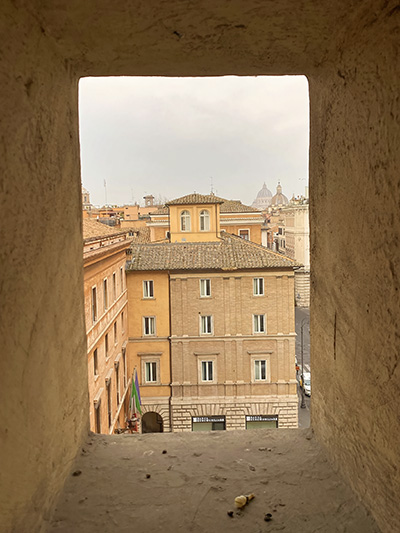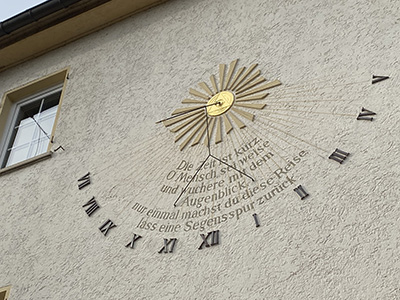As we slowly to move towards a synodal Church we should expect that there will be many stumbles, confusions, and false starts.
The enthusiasm of some for the Synodal Way is one side of the way all human societies make deliberate change. Likewise, the fears of Cardinal Walter Kasper and some other bishops are exactly what we should expect.
If we could see the future clearly, then it would be different – but no one has a crystal ball. The future always contains surprises. Some of these will be more wonderful than anyone has imagined; other will be worse than our greatest fears. That is simply the way it is!
One might imagine that it would be different with the Church – the Body of the Christ animated by the Spirit – and it has been the illusion of some Christians in every age that because they “had the faith” or “the Bible” or the “gift of magisterium” that their steps into the future were guaranteed!
Alas, we are always engaged in a process of discernment: we pray for the light of the Holy Spirit and we then try to glimpse the way forward. We walk forward by faith. The Church’s prayer is always that “by the light of the Spirit we may be truly wise and enjoy his consolation” (da nobis in … Spiritu recta sapere, et de eius semper consolation gaudere).
Wrong signals
If we cannot now know the outcomes of our decisions, what we might suspect, with Cardinal Kasper, will be a disaster. But it may turn out completely the opposite – and vice versa – so we can exercise some foreknowledge with regard to the signals our actions send out in the present.
Right now, I can know that something is being wrongly interpreted or wrongly used. What will happen tomorrow is, in an absolute sense, unknown; but what is faulty now can be known through an examination of evidence that has been building up for some time and is available to us. This is where we can take definite action for the better.
This is such a basic element of our thinking that we tend to ignore it and spend our time in more distant – and so imprecise – speculation.
We can easily illustrate this: will there be a fire in the house or will it be OK? I simply do not know, and I hedge my bets by having house insurance. Contrast that with the definite event that I smell smoke and hear the fire alarm now, right now. In this case, I do not speculate but act: I call the fire brigade.
Liturgy is not costume drama
We see this same decision process in the Church.
Some weeks ago, Pope Francis did not speculate that some clergy might or might not really want to take the reforms of Vatican II to heart. Rather, he saw that their actual activity now – wearing lace and birettas – sent out a signal that they did not like modernity.
This was not a “might be” or “might happen” but a definite signal to people by those priests that they preferred a former time. So the pope sent a clear and definite signal to them!
In effect, he told them that helping the People of God celebrate their liturgy – it belongs to all the baptized because when we assemble we are “wholly celebrant” – is what their ministry is about. It is not costume drama in which they, as clergy, have the leading roles and take the bows!

The view out of a Roman window: the view from outside, looking in, is very different!
But there are many other areas where the Church, or clergy, are right now sending out signals that indicate an actual problem – a fire that needs fighting urgently. And if these are not tackled, then it will make the whole synodal process, for both the fearful and the hopeful, little more than hot air.
Seen to be transparent
Long trained to discretion, indeed secrecy, most clergy are happier dealing with anything “scandalous” far from the public view. Hence, one episcopal conference after another has been found to have been involved in cover-ups! It would be interesting to know just how many bishops have had to resign in the last 25 years because they were seen “to have swept matters under the carpet”.
But this attitude – quite apart from the fact that it is morally unjust (criminals were allowed to create more suffering and went un-punished) and ecclesiologically inept (every member of the Church is as much a member as anyone else) – also failed to appreciate our cultural situation.
Lace inside the head
Many years ago I heard praise of a new bishop – arrived from a job in Rome – by some of the canons of his chapter: “He is the soul of discretion – his Vatican training is in his every move!”
I hope that would not be a vote of approbation by those priests today if they got a new bishop. Anyone who is so naturalized to secrecy, even to holding up the so-called “pontifical secret”, is actually unfit for a job in the Roman Curia, much less in a diocese.
Such a man is an inhabitant of a world that is long past. Such a man is wearing lace inside his head.
A world that craves transparency
Whenever we find examples of people doing things in a “smoke-filled room” or “behind closed doors” or without full reporting, we become suspicious. Sad experience has taught us that such “back room” procedures are usually the fore-runner of greater problems.
So, for example, we are not surprised to hear that there is a crackdown on a free press and open discussion in Vladimir Putin’s Russia. What might be labelled “judicious discretion” among two bishops in purple cassocks seems little different from “suppression” and “repression” when done by a military junta.
But time and again we see a minimalist approach to transparency from bishops. It is simply the wrong signal: it creates the impression that they cannot be trusted. Then it generates the question: why do they want to keep things back? Then: what have they to hide?
The breakdown of trust in the Church – which just might be generating those attitudes which cause the fears expressed by Cardinal Kasper – is a fact right now. Once people spontaneously generate that wonderful expression, the hermeneutic of suspicion, then there is a rupture in the magisterium.
This rupture is not a possible fruit of a mistaken approach to synodality (i.e. the equivalent of “will the house go on fire?” or “will there be a sea-battle tomorrow?”), but a simple fact for many of the baptized – they do not trust the official statements of bishops as anything more than statements intended to preserve power and prevent necessary change.
This level of suspicion of bishops has probably not been seen over wide areas of the Western Church since the sixteenth century.
An interesting slogan
Among disadvantaged groups this very significant statement is often repeated: Nothing about us, without us, is for us.
It is worth thinking carefully about the implications of this maxim.
It speaks of suspicion, the desire for transparency, and the desire for real – not token – consultation.
It also speaks about the experience of women who hear statements made about them and their bodies by men.
It speaks about married people hearing about the demands of the Christian life from celibates who have never had to worry about being out of work, never had to cope with the pressures of providing food or shelter or repaying a mortgage each month, nor dealing with the worries that are part of every relationship and family.
It speaks about hearing of “child protection measures” from men who do not have children but have profound professional identification with clerical abusers.
And the list goes on ….
Signs of the times
Let’s not worry about tomorrow’s potential problems, we have enough actuals that need urgent attention.
“So don’t worry about tomorrow, for tomorrow will bring its own worries. Today’s trouble is enough for today” (Mt 6:34).

Time is short! Some things are urgent! Transparency is a ‘sign of this time’
Time is short! Some things are urgent! Transparency is a ‘sign of this time’
We need to take heed of the signs of the times – and stop sending out the wrong signals.
You might say, “But transparency is not that important, and certainly not part of our moment! Let’s just ignore it!”
Well, some people in the Vatican have already seen that it is part of our historical moment – hence the accounts for Peter’s Pence have just been published for the first time. This is the transparency that is appropriate to a community such as the Church.
Anything that is less than full transparency – and being transparent about transparency – is a skandalon (a stumbling block) to evangelization.
- First published in La-Croix International. Republished with permission.
- Thomas O’Loughlin is a presbyter of the Catholic Diocese of Arundel and Brighton and professor-emeritus of historical theology at the University of Nottingham (UK). His latest book is Discipleship and Society in the Early Churches.
Additional reading
News category: Analysis and Comment, Special, Synodality1.




